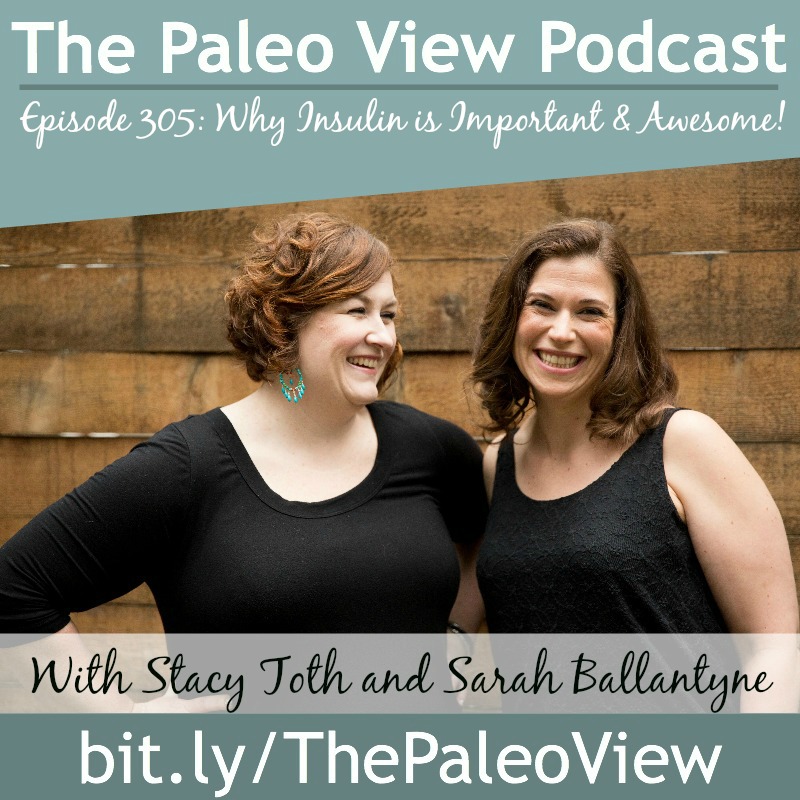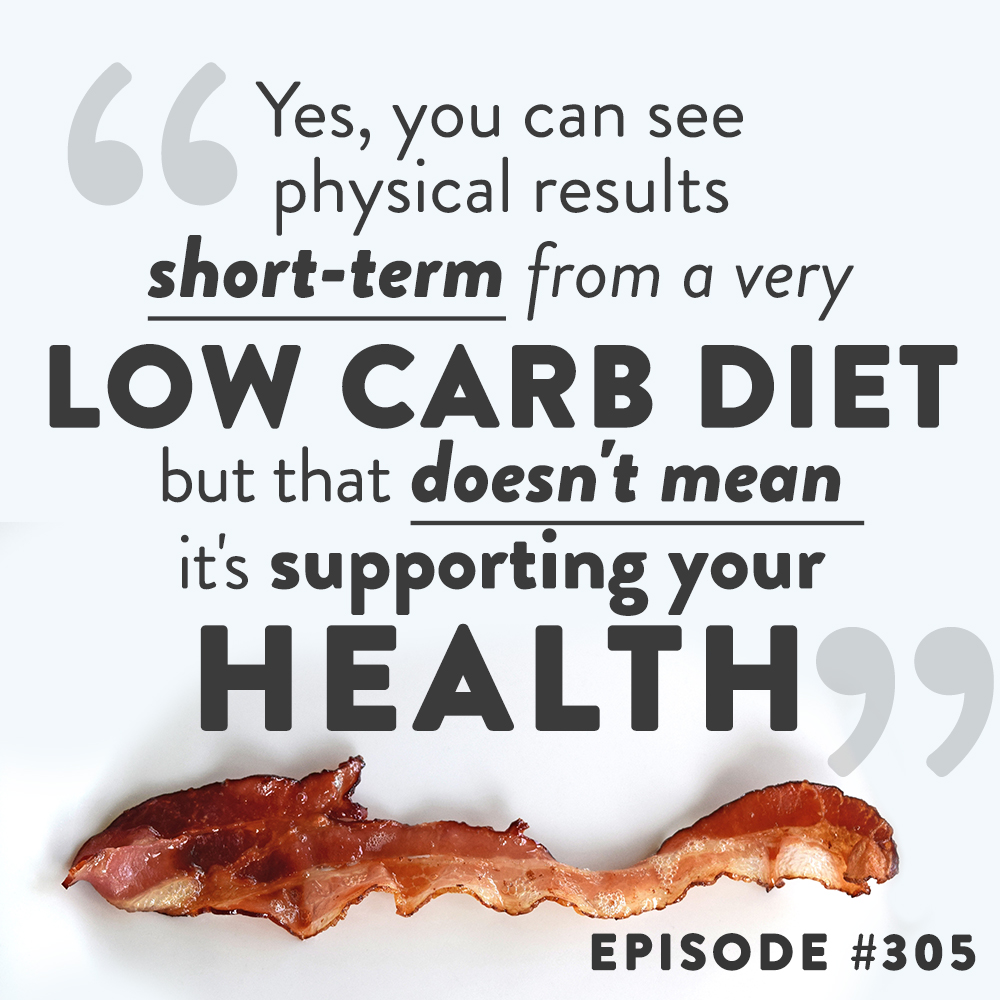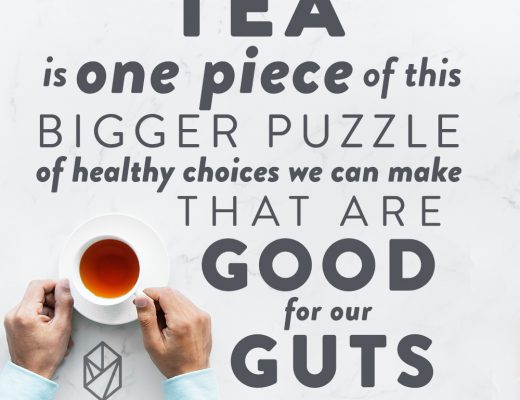Ep. 305: Why Insulin is Important & Awesome!

In this episode, Stacy and Sarah tell you about how awesome insulin is and why you shouldn’t be trying to go very low carb.
Click here to listen in iTunes
or download and listen by clicking the PodBean Player below
![]()
If you enjoy the show, please review it in iTunes!
The Paleo View (TPV), Episode 305: Why Insulin is Important & Awesome!
- Intro (0:00)
- News and Views (0:40)
- Sarah is on single-parent duty this week and is feeling the effects!
- Kudos to all you single parents out there who do it all.
- Stacy is in her busy season at work.
- Stacy wants to mention something that has been on her mind this week: it is easy to get wrapped up in wanting what someone else has- which is partly human nature.
- If this looks like jealous, anger, and frustration… those are not good feelings.
- Have patience and compassion, and consider reaching out and giving a compliment or asking for mentorship if you’re having these feelings.
- Sarah has become a regular contributor for Paleo Magazine.
- She wrote an article coming in the Aug/Sept issue about the case for more carbohydrates.
- This was spurred by the editor of the magazine noticing Sarah isn’t a supporter of very low carb diets.
- She wrote an article coming in the Aug/Sept issue about the case for more carbohydrates.
- Sarah is on single-parent duty this week and is feeling the effects!
- Insulin as a Super Hormone: Thyroid
- There are insulin receptors in just about every cell type.
- It isn’t always about shuttling glucose into the cells.
- Insulin is important for thyroid function.
- There are 3 different variations of the same enzyme that convert “inactive” T4 to “active” T3.
- This can happen in the thyroid or all over the body.
- The Type 2 Deiodase is the most active form.
- It is stimulated by insulin.
- This is how insulin feeds into thyroid function.
- With insulin resistance and diabetes there is a higher risk of hypothyroidism.
- It is stimulated by insulin.
- A recent paper looked at ketogenic diets in epileptics.
- 120 participants followed a mediterranean style ketogenic diet.
- 1 in 6 participants developed hypothyroidism requiring medication within the first 6 months.
- 8 of these participants developed hypothyroidism within the first month.
- The ketogenic community counter-argues that any weight loss diet causes suppression of the thyroid.
- The difference is the magnitude, and their hypothyroidism requiring medication.
- We want to maintain proper insulin signaling because insulin is important!
- You do want some insulin.
- Don’t eat all the sugar.
- Slow burning carbs like root vegetables and fruits are generally low glycemic load.
- It’s not about ditching all carbohydrates at all costs.
- You do want some insulin.
- There are 3 different variations of the same enzyme that convert “inactive” T4 to “active” T3.
- Stacy knows the low carb does not work for her- it caused her to have major health crash.
- Sarah has been a loud voice of decent for the ketogenic diet.
- Most people who are recommending this diet are not presenting a balanced look at what science tells us.
- Ketogenic diet can be therapeutic in people with neurologic and neurodegenerative disease.
- Ketogenic diet is not a healthy way to lose weight.
- The cost/benefit for this vs. someone with a neurological disease is very different.
- When you take out large amounts of vegetables from your diet, as keto or very low carb does, it is hard to be healthy.
- It would be difficult to eat the recommended amount of vegetables and still be very low carb.
- There are insulin receptors in just about every cell type.
- Insulin as a Super Hormone: Other roles not related to blood glucose.
- Insulin is important for muscle growth and repair.
- It helps bring amino acids into muscle tissue, including BCAA.
- It stimulates muscle protein synthesis.
- It suppresses protein break down.
- We see this reflected in insulin resistance, diabetes, and ketogenic diets.
- A side effect of diabetes is poor muscle strength and function with age compared to healthy individuals.
- One study compared weight loss in a balanced macronutrient diet vs. ketogenic.
- It showed there was no metabolic advantage to a ketogenic diet.
- Ketogenic diet group lost more muscles mass than the balanced macronutrient group.
- 2 things important for maintaining lean muscle mass during weight loss.
- 1. High protein intake: 20-30% of calories.
- 2. Physical activity helps stimulate muscle growth and repair.
- Insulin is important for bone mineralization.
- Bone is constantly turning over- breaking down and rebuilding itself.
- This is driven by osteoclasts (break down bone) and osteoblast (build bone).
- As we age, osteoclast activity remains more constant and osteoblast activity slows.
- Insulin is important for signaling osteoblasts and drives its activity.
- This is driven by osteoclasts (break down bone) and osteoblast (build bone).
- Bone cells are signaling to the pancreas, helping to control insulin sensitivity.
- There is growing research suggesting that osteoporosis is like “bone diabetes.”
- This might be driven by insulin resistance in our bones.
- Similarly, Alzheimers disease is thought to be driven by insulin resistance in our brain.
- Type 2 Diabetics have 69% increase bone fracture rate.
- There is growing research suggesting that osteoporosis is like “bone diabetes.”
- Bone is constantly turning over- breaking down and rebuilding itself.
- Insulin is important for muscle growth and repair.
- The Case for More Carbs can be found here.
- There is a lot more detail in this article that Sarah wrote, but here are some highlights:
- Insulin is important for cognitive health, promoting learning and memory.
- Insulin has an impact on neuro-inflamation.
- Insulin is important for turning off these inflammatory cells.
- This could be why insulin resistance in the brain is linked with other neurological diseases.
- There is impact on cognitive performance in diabetics and ketogenic diets.
- Mood problems, psychological adjustment in kids.
- Ketogenic diet caused adults to be less motivated to exercise in one study.
- A study in young, healthy men showed short-term ketogenic diets caused reduced concentration, slower memory retrieval, and slower processing of visual information.
- Insulin is a happy medium hormone. If it gets too high or low, the wheels fall off the cart.
- Every single thing in human health is designed around a happy-medium range in which it functions.
- Yes, you can see physical results short-term from a very low carb diet, but that doesn’t mean it’s supporting your health.
- There is a lot more detail in this article that Sarah wrote, but here are some highlights:
- If you’ve enjoyed the show, please recommend it to someone who might enjoy it.
- We love when you share and when you leave reviews for us! Thanks for listening!
Support us by shopping through links on our sidebars- thank you!





